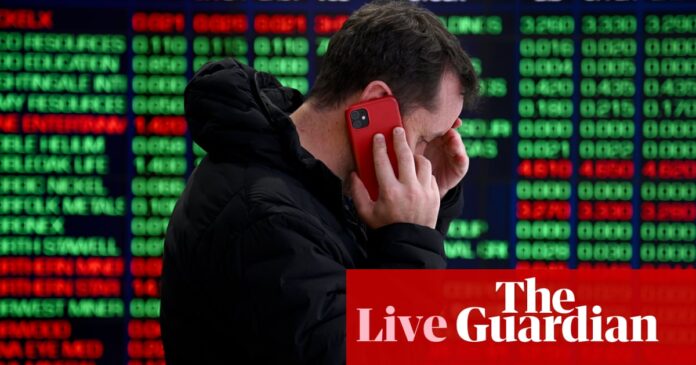Australian dollar collapses to Covid levels
Luca Ittimani
The Australian dollar has fallen to its lowest level since Covid against the US dollar as global markets sell off against the prospects of a global recession.
One dollar was buying just 60 US cents on Monday morning after falling to a low of 59.64, its lowest point since April 2020. It was worth 64 US cents on Wednesday, hours before US president Donald Trump set markets reeling with his tariff announcement.
The Australian dollar also reached pandemic-era lows in Europe, with one dollar buying just 54.4 Euro cents or 46.2 British pence at its lowest point on Monday morning.

Markets were even selling off the Australian dollar in Asia. It was worth less than 15,500 Vietnamese dong on Monday, when it had been buying almost 16,500 dong on Wednesday. The dollar slumped in India, Indonesia and New Zealand as well.
The Australian economy and therefore the dollar is heavily engaged in global trade, with investors buying big when they expect a global boom and selling off when they fear a crash, according to AMP economist My Bui:
When there is concern about a global slowdown, and particularly from the tariff and global trade war, then there is less demand for our commodity.
Key events
PM sidesteps issue of Victorian premier’s popularity
Anthony Albanese stood alongside Victorian premier Jacinta Allan today, but dodged questions on Allan’s popularity in the state, and whether that was a “drag” on his electoral chances.
Albanese has done three press conferences so far in Melbourne, but this is the first time Allan has been with him. The last time, he said she wasn’t there because the Victorian parliament was sitting.
He sidestepped questions today saying, “we’ll partner with state and territory governments right around the country. That’s what we do”.
Albanese was also asked to comment on the state of Victoria’s budget under Allan, which unsurprisingly, he wouldn’t do.
I’m responsible for my budget, I’m happy to answer questions about my budget. The premier’s right here. If you want to ask her a question about Victoria, I’m happy for her to do that.
But the question of whether Allan could have an impact on federal Labor’s chances is a very real one.
You can read more about that in Benita Kolovos’ piece here:

Caitlin Cassidy
Coalition accused of ‘scapegoating’ over plans to cut international student numbers
The National Tertiary Education Union has warned the Coalition’s international student cap of 240,000 international student enrolments a year would threaten thousands of jobs in the public education sector and undermine research capabilities.
NTEU national president, Dr Alison Barnes, said the “reckless policy” would “potentially lead to thousands of job losses across the sector”, based on previous impacts during the pandemic.
Peter Dutton’s Coalition has adopted rhetoric that demonises international students, using extreme Trumpist language that evokes harmful stereotypes rather than addressing real policy issues. Last year, he referred to international students as ‘modern-day boat arrivals’ – rhetoric that damages Australia’s reputation as a welcoming destination for global talent.
The Greens deputy leader and spokesperson for higher education, Senator Mehreen Faruqi, similarly accused the Coalition of “racist dog-whistling” and “scapegoating”.
Dutton and his Trump-mirroring Liberals have no solutions to offer on housing or higher education, so as usual they take the divisive, racist route.
In a joint statement, the Coalition said it believed in a “sensible and managed migration program that is in line with our capacity to adequately provide for infrastructure and housing”.
We will not allow high migration settings to erode living standards, overburden our infrastructure and exacerbate housing shortages in our communities.

Caitlin Cassidy
Industry leaders react to Coalition’s proposed international student cut
Business and industry leaders have come out swinging at the Coalition over their proposal to cut at least 80,000 new international students from Australian higher education institutions.
CEO of the International Education Association of Australia, Phil Honeywood, said there had been no consultation with the sector on the proposed enrolment caps or drastic increases to student visa charges, including $5,000 at Group of Eight institutions.
While it must be tempting for Peter Dutton to play the Donald Trump anti-migration card to voters in this election, he would do well to be better advised on a few key facts. According to the ABS, international education provides a $50bn per annum injection into our national economy. It is currently the biggest industry in the states of Victoria and South Australia.
Universities Australia CEO, Luke Sheehy, said the proposed cuts would “take a sledgehammer” to one of Australia’s biggest income generators, estimating a $5bn hit in the short term.
We urge all parties to base policy on facts, not finger pointing. We’re ready to work constructively on real solutions, but cuts like these will only harm the nation’s prosperity at a time we can least afford it.

Emily Wind
Liberals Against Nuclear urges rethink of energy policy amid WFH backflip
Liberals Against Nuclear is urging the Coalition to dump its nuclear energy policy, after this morning’s backflip on working from home.
Spokesperson Andrew Gregson said this shows opposition leader Peter Dutton can “listen to voters and change course when a policy is proving unpopular”.
His willingness to say ‘we have listened’ on the public service issue is commendable. We now urge him to apply that same political flexibility to the $600bn nuclear power plan that’s alienating voters across the country.
Gregson said the Coalition is “struggling to connect with voters, especially women, and nuclear is a major factor in this disconnect”.
If the Coalition can show flexibility on work arrangements for existing public servants, surely it can reconsider a policy that would add thousands more public servants to regulate and operate nuclear plants, while adding $665 to the average household’s annual power bill during a cost-of-living crisis.
Earlier this morning, the shadow treasurer Angus Taylor seemingly ruled out any change to the Coalition’s policy on nuclear.
Australian dollar collapses to Covid levels

Luca Ittimani
The Australian dollar has fallen to its lowest level since Covid against the US dollar as global markets sell off against the prospects of a global recession.
One dollar was buying just 60 US cents on Monday morning after falling to a low of 59.64, its lowest point since April 2020. It was worth 64 US cents on Wednesday, hours before US president Donald Trump set markets reeling with his tariff announcement.
The Australian dollar also reached pandemic-era lows in Europe, with one dollar buying just 54.4 Euro cents or 46.2 British pence at its lowest point on Monday morning.
Markets were even selling off the Australian dollar in Asia. It was worth less than 15,500 Vietnamese dong on Monday, when it had been buying almost 16,500 dong on Wednesday. The dollar slumped in India, Indonesia and New Zealand as well.
The Australian economy and therefore the dollar is heavily engaged in global trade, with investors buying big when they expect a global boom and selling off when they fear a crash, according to AMP economist My Bui:
When there is concern about a global slowdown, and particularly from the tariff and global trade war, then there is less demand for our commodity.
Last day to enrol to vote!
Folks, I’m sure you’re absolutely on top of it – but a reminder that today is 7 April and that means that it’s the last day to enrol to vote!
So if you haven’t already, take a look at our handy explainer which has all you need to know about enrolling:

Jonathan Barrett
ASX rout follows China-US tariff fight
There are few places to hide on the ASX this morning, with everything from banking to mining and energy stocks all down sharply.
Shares in Australia’s two biggest listed companies, Commonwealth Bank and BHP, are both down more than 8% in early trading.
The ASX sell-off follows a sharp fall on Wall Street on Friday, weighed down by China’s retaliatory tariffs to Donald Trump’s new trade regime.
Traders view Australia’s economy as closely tied to China through their significant trading relationship.
Election campaign day 10, through the lens
There’s been plenty of action on the campaign trail this morning, with both leaders visiting electorates they each need to hold – with the PM in McEwan, Victoria and Peter Dutton in Sturt, South Australia.
We’ve got some great pics of what the two have been up to.
Dutton avoids offering clarity on modelling on job cut policy
The Coalition won’t reveal what modelling they have done on their work from home policy and won’t say when he decided to focus on attrition and hiring freezes instead of redundancies.
Dutton says again the Parliamentary Budget Office has run some numbers on how their policy will work (but again won’t provide more clarity.)
He’s also asked what that means for the Department of Defence or the education department – which Dutton singled out for having a lot of public servants working in Canberra, despite the federal department not running a school.
If we’ve got a hiring freeze, natural attrition and we’ll address the positions that are surplus to the need. So I want to make sure that we get frontline services properly invested in, and that’s exactly the point we’ve made from day one. I want to make sure that Australians seek value for money when they’re working harder than ever for every dollar they earn.
Another reporter also highlights Dutton’s previous comments singling out diversity and inclusion roles in the public service that he had said “do nothing to improve the lives of everyday Australians”.
Dutton doesn’t exactly answer that question, and just says households want to know their money is being spent efficiently, and mentions the Coalition’s stance against the voice referendum and how Labor’s spending on that referendum was a “waste”.
What we need to do is act in Australia’s best interests, and we do that by having an efficient public service that delivers the services that are important, that are important to Australians …
We believe very strongly that when the prime minister stood up and spent the first 16 months of his government talking about the voice and spending $425m, that that was a waste.
ASX 200 loses $160bn in 15 minutes at opening as Trump tariff trade war fears intensify

Jonathan Barrett
More than $160bn has been wiped off the Australian share market this morning as fears of a full-blown trade war grip investors.
The benchmark S&P/ASX 200 sank more than 6% to trade below the 7200 point mark within 15 minutes after the market opened on Monday.
The sell-off follows a sharp fall on Wall Street on Friday, weighed down by China’s retaliatory tariffs to Donald Trump’s new trade regime .
The Australian dollar has also fallen sharply to trade below 60 US cents.
Dutton defends shadow cabinet gender numbers after work from home policy turnabout
The work from home backflip questions keep coming, forcing Dutton to continue apologising – while continuing to blame Labor for creating a “scare campaign” around the issue.
Dutton is asked whether the policy would have gotten off the ground if the Coalition had more women in its shadow cabinet in the first place.
He says they have the same number of women in their shadow cabinet as Labor has in their cabinet.
We have the same amount, same number of women in the shadow cabinet as Labor does, exactly the same number. And I have some incredible colleagues, not just sitting around that table, but behind me and in our party room as well. And we have, I think, demonstrated in our policies that we want to help families, we want to help women, young women, and we want to make sure that we can do that in a vibrant economy.
Dutton says job cut savings modelling done with the Parliamentary Budget Office will be released
Earlier this morning, the employment minister, Murray Watt, said any government would struggle to bring down public service numbers by 41,000 through natural attrition and hiring freezes over the space of five years. (That’s the Coalition’s current job cuts policy, as it has ditched its forced redundancies policy).
Dutton is asked if he’s confident that 41,000 people will be willing to quit and how exactly the Coalition would be able to raise the billions of dollars it had previously promised through the policy. He hints that there’s been some sort of modelling done on that.
We have worked with the Parliamentary Budget Office to achieve that profiling. That’s the work we’ve done with the PBO. And we’ll have more to say about that.
Dutton blames Labor for ‘scare campaign’ over work from home
Back to Peter Dutton fronting the media, and we’re on to questions – no surprises here: the first one is on work from home.
He’s asked just how bad the polling was to make a decision like this in the middle of the election campaign. Dutton says he now strongly supports flexible arrangements, and has blamed Labor for creating a scare campaign on the policy.
I have apologised for the decision we took in relation to work from home. It only applied to Canberra. Labor’s run this scare campaign and I think we bring an end to that today. And we strongly support flexible workplace arrangements.
Investors brace for ASX plunge

Jonathan Barrett
The Australian sharemarket is positioned for a major sell-off on Monday morning as investors brace for a full-blown global trade war sparked by Donald Trump’s new tariff regime.
Australia’s share price index futures are pointing down more than 5%, which would shift the benchmark S&P/ASX 200 to its lowest level in more than a year.
This would represent well over $100bn being wiped off the value of the share market, diminishing the value of most investment and superannuation portfolios.
The anticipated move follows sharp falls on Wall Street on Friday, weighed down by China’s retaliatory tariffs.
The Australian dollar has also fallen sharply.
Dutton spruiks fuel excise and roads investments in South Australia
Peter Dutton is standing up in the ultra-marginal seat of Sturt in South Australia, which the party is trying to hold on to (and both Labor and the Greens have been eyeing).
He’s staring on a more local announcement about the greater Adelaide freight bypass, saying a Coalition government would promise 80% of the cost.
Speaking of roads, he’s also plugging the Coalition’s promise to cut the fuel excise.
If you support our candidates here in South Australia, if you support a coalition government, we’ll slash the price of petrol and diesel by 25 cents a litre.
Le on who she might support in a hung parliament: ‘I’ve got to win this election first’
Le also weighs in on the work from home backflip and says workers that need flexible and family-friendly arrangements should be supported. But for her community, the majority of workers are operating in factories or are teachers, nurses and retail workers who can’t work from home.
On who she might support in the event of a hung parliament, she says:
I got chucked out by the Liberal party, so I’m glad to be an independent… I’m there to represent, in making sure my community gets the resources and infrastructure they need. Let’s wait till the results of the election. I don’t want to be presumptuous, I’ve got to win this election first.
Dai Le: cost of living help could be ‘too little, too late’
Independent MP Dai Le, who sensationally beat Labor’s parachuted candidate Kristina Keneally at the last election, says she’s glad to see the focus on cost of living, but wonders if it’s a bit too late.
Le says both the tax cuts legislated by Labor and the fuel excise cut promised by the Coalition will go some way to help her constituents living in Western Sydney. The excise cut is something she’s also previously called for.
It’s great to see the major parties are now campaigning on those issues. I wonder though, it’s a bit too little, too late for our community.
I think [the] stage-three tax cuts revised was very good, Hecs reduction was great … any kind of help, people will appreciate it. …I think [the] petrol fuel excise, obviously that has been something I have been asking for as well …people are still feeling the pain and choosing between heating and eating.
Sukkar says ‘huge number of our homes are being occupied by international students’ as Coalition proposes caps
A little earlier this morning, the shadow housing minister, Michael Sukkar, was on ABC RN Breakfast, talking about the Coalition’s policy announcement over the weekend that they’ll cut international student numbers to help fix the housing crisis.
Labor had tried to legislate a cap on international students last year, but the Coalition had refused to give their support (and so had the crossbench).
While experts and industry groups have said international students only make up around 4% to 6% of rentals in Australia, Sukkar says he think Australians would be “utterly startled” by that figure:
I think they [Australians] would be utterly startled to find that 6% of our rental stock in this in the entire nation is taken up by international students… 6% of our entire rental stock is being occupied by foreign students. I don’t think that makes the point that those are suggesting, I think it makes the exact point we’re making. A huge number of our homes are being occupied by international students.
Sukkar says the Coalition’s policy would cut around 80,000 international students, but that there will still be a “very significant” number of the cohort in Australia, by international standards.
Is that all true? Here’s our factcheck:



